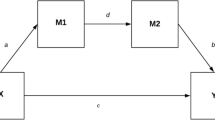Abstract
The majority of studies on attribution in marriage have examined hypothetical behaviors, raising the possibility that results are not applicable to actual marital events. In addition, it is not known whether attribution biases found for partner versus self-behavior in distressed and nondistressed spouses occur for clinically relevant problem behaviors. To examine these issues, wives seeking marital therapy and nondistressed wives from the community made responsibility attributions for self- and partner behaviors identified as problematic for the relationship and for hypothetical behaviors used in past research. The pattern of responses obtained for distressed and nondistressed groups was not affected by the real or hypothetical nature of the behavior. In addition, attributions for problem-related and hypothetical behaviors predicted marital satisfaction equally well. In regard to attribution biases, distressed spouses saw their own behavior as more unselfishly motivated and unintentional than spouse behavior. Nondistressed spouses made equally benign attributions for both self- and partner behavior. The conceptual and clinical significance of the results are outlined.
Similar content being viewed by others
References
Arias, I., & Beach, S. R. H. (1987). The assessment of social cognition in the context of marriage. In K. D. O'Leary (Ed.),Assessment of marital discord (pp. 109–137). Hillsdale, NJ: Erlbaum.
Baucom, D. H. (1987). Attributions in distressed relations: How can we explain them? In S. Duck & D. Perlman (Eds.),Intimate relationships: Development, dynamics, and deterioration (pp. 177–206). London: Sage.
Baucom, D. H., Bell, W. G., & Duhe, A. (1982).The measurement of couples' attributions for positive and negative dyadic interactions. Paper presented at the annual meeting of the Association for Advancement of Behavior Therapy, Los Angeles.
Baucom, D. H., & Lester, G. W. (1986). The usefulness of cognitive restructuring as an adjuct to behavioral marital therapy.Behavior Therapy, 17 385–403.
Bradbury, T. N., & Fincham, F. D. (1988a). Individual difference factors in close relationships: A contextual model of marriage as an integrative framework.Journal of Personality and Social Psychology, 54 713–721.
Bradbury, T. N., & Fincham, F. D. (1988b).Attributions in marriage: Review and critique. Manuscript submitted for publication.
Bradbury, T. N., & Fincham, F. D. (in press). Assessing spontaneous attributions in marital interaction: Methodological and conceptual considerations.Journal of Social and Clinical Psychology.
Camper, P. M., Jacobson, N. S., Holtzworth-Munroe, A., & Schmaling, K. B. (1988). Causal attributions for interactional behaviors in married couples.Cognitive Therapy and Research, 12 195–209.
Epstein, N., Pretzer, J., & Fleming, B. (1987). The role of cognitive appraisal in self-reports of marital communication.Behavior Therapy, 18 51–69.
Fincham, F. D. (1985a). Attributions in close relationships. In J. H. Harvey & G. Weary (Eds.),Attribution: Basic issues and applications (pp. 203–234). New York: Academic Press.
Fincham, F. D. (1985b). Attribution processes in distressed and nondistressed couples: 2. Responsibility for marital problems.Journal of Abnormal Psychology, 94 183–190.
Fincham, F. D., Beach, S. R. H., & Baucom, D. H. (1987). Attribution processes in distressed and nondistressed couples: 4. Self-partner attribution differences.Journal of Personality and Social Psychology, 52 739–748.
Fincham, F. D., Beach, S. R. H., & Nelson, G. (1987). Attribution processes in distressed and nondistressed couples: 3. Causal and responsibility attributions for spouse behavior.Cognitive Therapy and Research, 11 71–86.
Fincham, F. D., & Bradbury, T. N. (1987a). The impact of attributions in marriage: A longitudinal analysis.Journal of Personality and Social Psychology, 53 510–517.
Fincham, F. D., & Bradbury, T. N. (1987b). Cognitive processes and conflict in close relationships: An attribution-efficacy model.Journal of Personality and Social Psychology.
Fincham, F. D., & Bradbury, T. N. (1988). The impact of attributions in marriage: Empirical and conceptual foundations.British Journal of Clinical Psychology, 27 77–90.
Fincham, F. D., & Bradbury, T. N. (in press). The impact of attributions in marriage: An experimental analysis.Journal of Social and Clinical Psychology.
Fincham, F. D., & Jaspars, J. M. F. (1980). Attribution of responsibility: From man the scientist to man-as-lawyer. In L. Berkowitz (Ed.),Advances in experimental social psychology (Vol. 13, pp. 81–138). New York: Academic Press.
Fincham, F. D., & O'Leary, K. D. (1983). Causal inferences for spouse behavior in maritally distressed and nondistressed couples.Journal of Social and Clinical Psychology, 1 42–57.
Holtzworth-Munroe, A., & Jacobson, N. S. (1985). Causal attributions of married couples: When do they search for causes? What do they conclude when they do?Journal of Personality and Social Psychology, 48 1398–1412.
Holtzworth-Munroe, A., & Jacobson, N. S. (in press). Toward a methodology for coding spontaneous causal attributions: Preliminary results with married couples.Journal of Social and Clinical Psychology.
Jacobson, N. S., McDonald, D. W., Follette, W. C., & Berley, R. A. (1985). Attributional processes in distressed and nondistressed married couples.Cognitive Therapy and Research, 9 35–50.
Locke, H. J., & Wallace, K. M. (1959). Short Marital Adjustment and Prediction Tests: Their Reliability and Validity.Marriage and Family Living, 21 251–255.
Shaver, K. G. (1985).The attribution of blame: Causality, responsibility and blameworthiness. New York: Springer-Verlag.
Sillars, A. L. (1985). Interpersonal perception in relationships. In W. Ickes (Ed.),Compatible and incompatible relationships (pp. 277–305). New York: Springer-Verlag.
Author information
Authors and Affiliations
Additional information
We thank Thomas Bradbury for his helpful comments on earlier drafts of the manuscript and Toni Di Prima for his assistance in collecting the data. The paper was written while the first author was a fellow at the Center for Advanced Study at the University of Illinois and was supported as a faculty scholar by the W. T. Grant Foundation. The research was conducted while the first author was supported by grant number 1-5-32169 from the National Institute of Child Health and Human Development.
Rights and permissions
About this article
Cite this article
Fincham, F.D., Beach, S.R.H. Attribution processes in distressed and nondistressed couples: 5. Real versus hypothetical events. Cogn Ther Res 12, 505–514 (1988). https://doi.org/10.1007/BF01173416
Issue Date:
DOI: https://doi.org/10.1007/BF01173416




